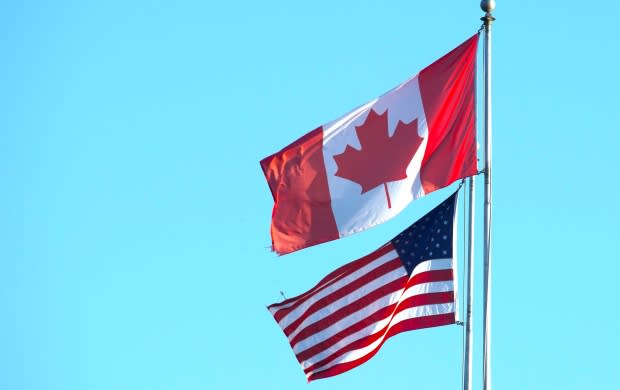'They should not be going ashore': U.S. vessels in B.C. waters rattle Vancouver Island boaters
Boaters on Vancouver Island are concerned that private American vessels may be entering Canadian waters on a promise to travel to Alaska but are, instead, visiting marinas, docking their ships and coming ashore.
After hearing numerous reports from concerned friends spotting boats flying an American flag, Bill Wilson, president of the Council of B.C. Yacht Clubs, sent a letter to his 10,000 members, asking everyone to keep a lookout for U.S. ships and to let him know what they were seeing.
Wilson says he immediately began receiving two or three emails a day.
"When we see the [COVID-19] numbers coming out of the U.S … the real concern is the possibility of spreading the virus," said Wilson.
"Within B.C., we've done such a terrific job of really controlling it."
The Alaska Loophole, by boat
Wilson believes that some Americans may be using the "Alaska loophole," where U.S. citizens travelling for essential reasons, such as returning home to Alaska, enter Canada without the intention of actually travelling directly to America's largest state.
Wilson says his fellow members will often watch private U.S. boats as they enter Canada through the automated identification system which tracks vessels. The boat will head northbound, he says, but by the next day, it will be travelling in a new direction.
He says he often receives reports of ships docking at marinas in Brentwood and Bedwell bays that are not on a direct route from where they first entered into Canada.
"A lot of these boats appear to be crossing the border and then taking their time and enjoying cruising in Canadian waters," he said.

In one situation, his team watched a boat clear customs only to be spotted 14 days later moored in April Point, near Campbell River.
"That doesn't sound to me like going to Alaska," he said.
Unsatisfied with the number of boaters that are making it across the border and their indirect routes, Wilson says many marinas are now denying access to American vessels.
Peter Stockdill has also been working with the councils to track U.S. boaters and he worries that some of them may not be following quarantine and physical distancing rules when they dock for fuel and other supplies.
In fact, he's witnessed American boaters out and about, at which point he contacted the RCMP, who quickly located them, he says.
"They should not be going ashore anywhere, in any populated area, while going on their voyage to Alaska," said Stockdill.
Travellers only permitted essential stops, says CBSA
While essential travel through Canadian waters is permitted, the Canadian Border Services Agency says travellers are still subject to 14-day quarantine requirements.
As well, they're only permitted to make essential stops along the way, such as refuelling and restocking necessary supplies.
"Travellers will be asked to practice social distancing and are required to wear a non-medical mask or face coverings during these stops … if they have to leave their boat to obtain supplies that cannot be delivered," said Judith Gadbois-St-Cyr, with CBSA.
And if travellers need to dock and spend a night in a marina, Gadbois-St-Cyr says travellers are required to remain on their boats.
Hotels, she says, may be used for quarantine purposes.
"All travellers entering Canada, including foreign national boaters who drop anchor in Canadian waters, must report to the CBSA," said Gadbois-St-Cyr.
Failing to report is a serious offence, she says, that is subject to prosecution, while disobeying the current border restrictions under the Quarantine Act could lead to monetary fines and imprisonment.
Gadbois-St-Cyr is quick to warn, however, that there may be a legitimate reason for the presence of a U.S. boat in Canada such as dual citizens, essential workers or immediate family members.

